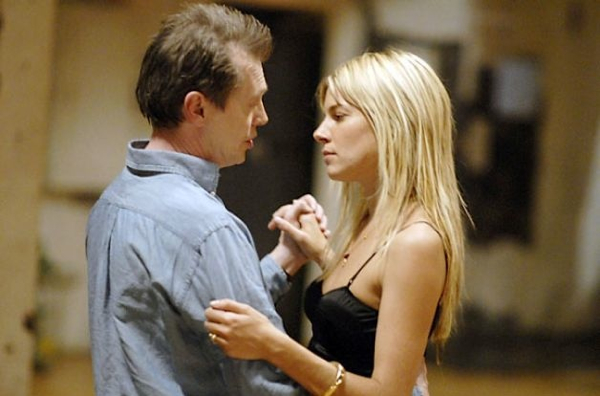Movie review by Greg Carlson
In Steve Buscemi’s remake of Theo van Gogh’s 2003 “Interview,” the writer-director-star shares the screen with tabloid fixture Sienna Miller, who plays a bratty, spoiled starlet most audience members will assume is rather close to the truth. Of course, the gamesmanship on display between the two principal characters argues that there is no such thing as reality, and Buscemi’s nimble direction makes the most out of what is essentially a single location story. Van Gogh was planning an English language version of his loosely improvisational “Interview” at the time of his politically motivated murder, and Buscemi’s film operates as a tribute to the slain provocateur. Fans of theatrical, two-character drama will enjoy watching the intriguing exchanges that fuel the movie’s action, but those expecting cinematic fireworks must resign themselves to the fact that there are only so many ways one can frame a NYC loft.
Buscemi plays Pierre Peders, a bitter political journalist nursing a serious grudge against the editor who assigned him to a toothless puff piece on rising hottie Katya (Miller), a self-obsessed up-and-comer used to being the center of attention. Kept waiting at a restaurant for more than an hour, Pierre lets Katya know that she means nothing to him, and his admonishment triggers her most base narcissistic impulses. The interview seems to be over before it begins, but Pierre is injured in a minor fender bender caused in part by Katya, who insists he accompany her back to her apartment so she can attend to his wound.
Once Pierre and Katya settle in to her spacious pad, they begin a devilish dance that finds them swerving back and forth between weird attraction and total contempt for one another. The writing darts through all sorts of psychological minefields, alighting periodically on father/daughter baggage carried by both parties, as well as the easy codependence shared by longtime substance abusers. Alcohol, cocaine, and a variety of pills fuel the snaky conversation and loosen the tongues of the already uninhibited combatants.
The movie’s handheld photography, which is rendered in the muted tones provided by digital video, replicates the style preferred by van Gogh. As the performers circle each other, so do the cameras, instilling a sense of woozy, uneasy intimacy. Miller and Buscemi seem to relish the opportunity to sink their teeth into roles that allow for such violent mood swings, and the fact that their characters spin all sorts of lies for a living sustains interest throughout the essentially real-time unfolding of the story.
At one point in the movie, Katya and Pierre agree to reveal dark secrets to each other. By this time, the number of individual accusations, tantrums, crying jags, and quasi-seductions has reached a fever pitch, and viewers won’t know who to believe anymore. “Interview” doesn’t say anything new about the parasitic relationship between celebrities and members of the press, or for that matter the consumers who clamor for personal information about the rich and famous, but Buscemi and Miller are consistently compelling to observe. At the end, the battle of wits and wills between Katya and Pierre is revealed to have a clear victor, but one leaves the theater thinking that both of these unsavory vampires are more loser than winner.
